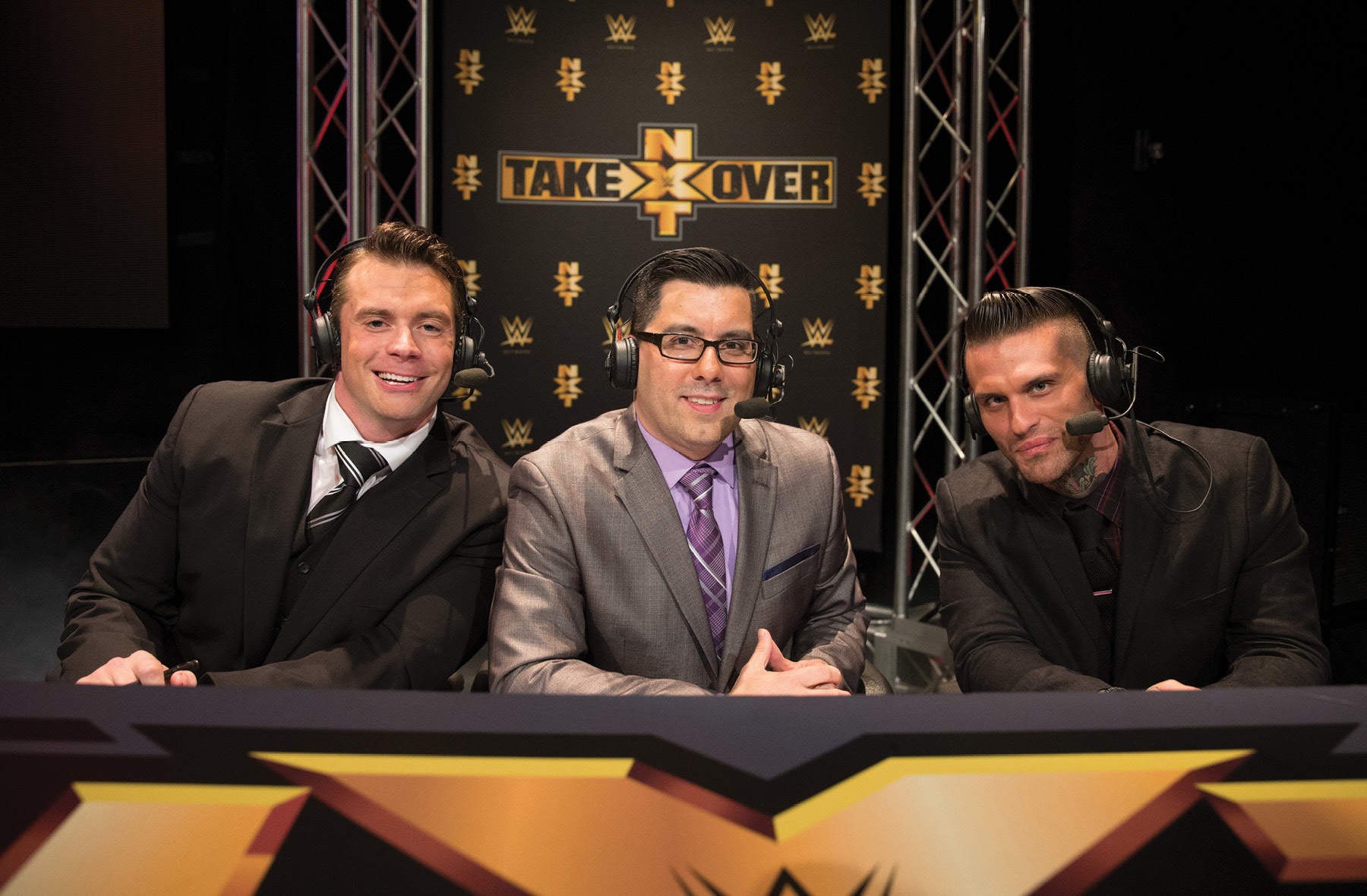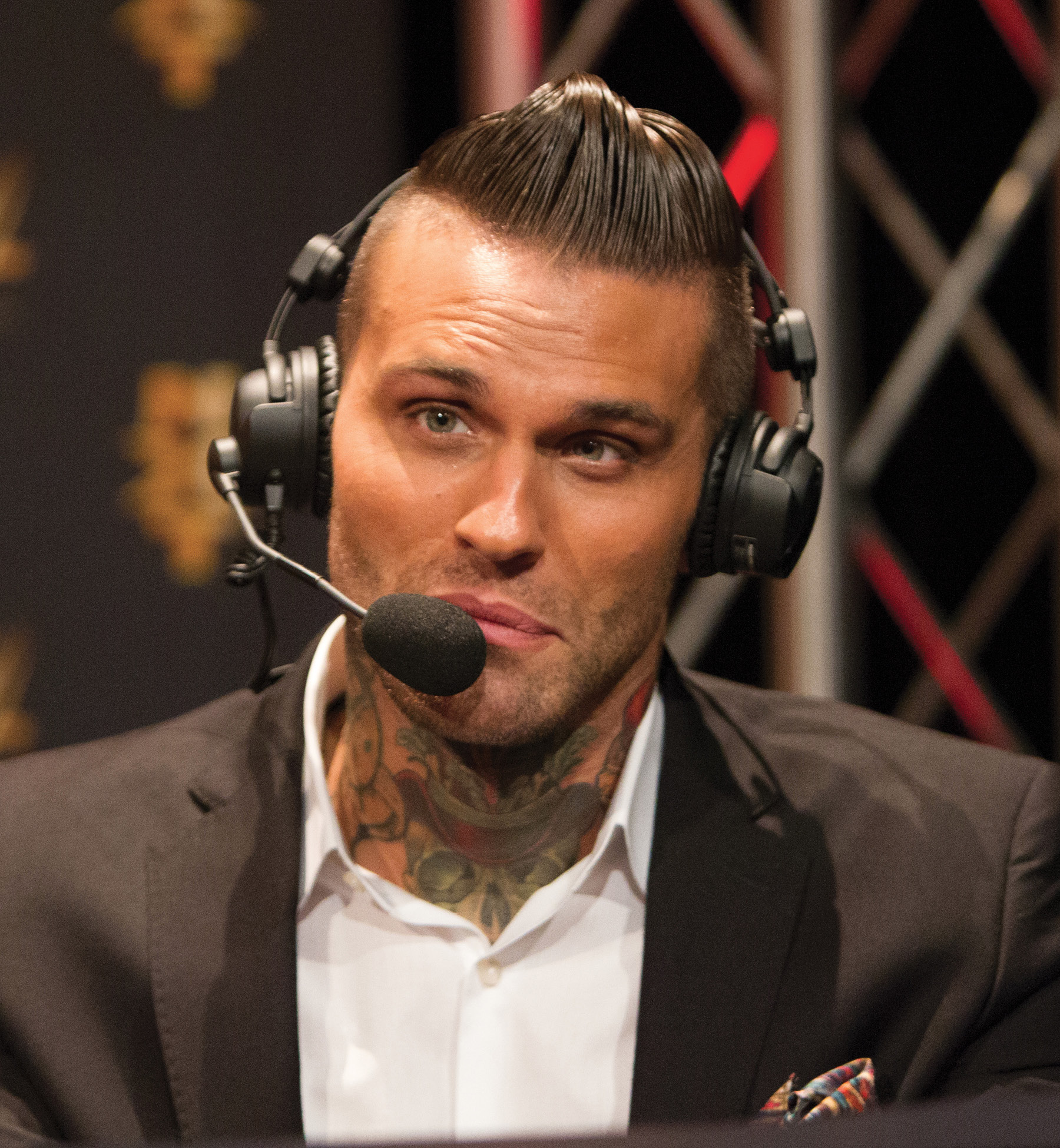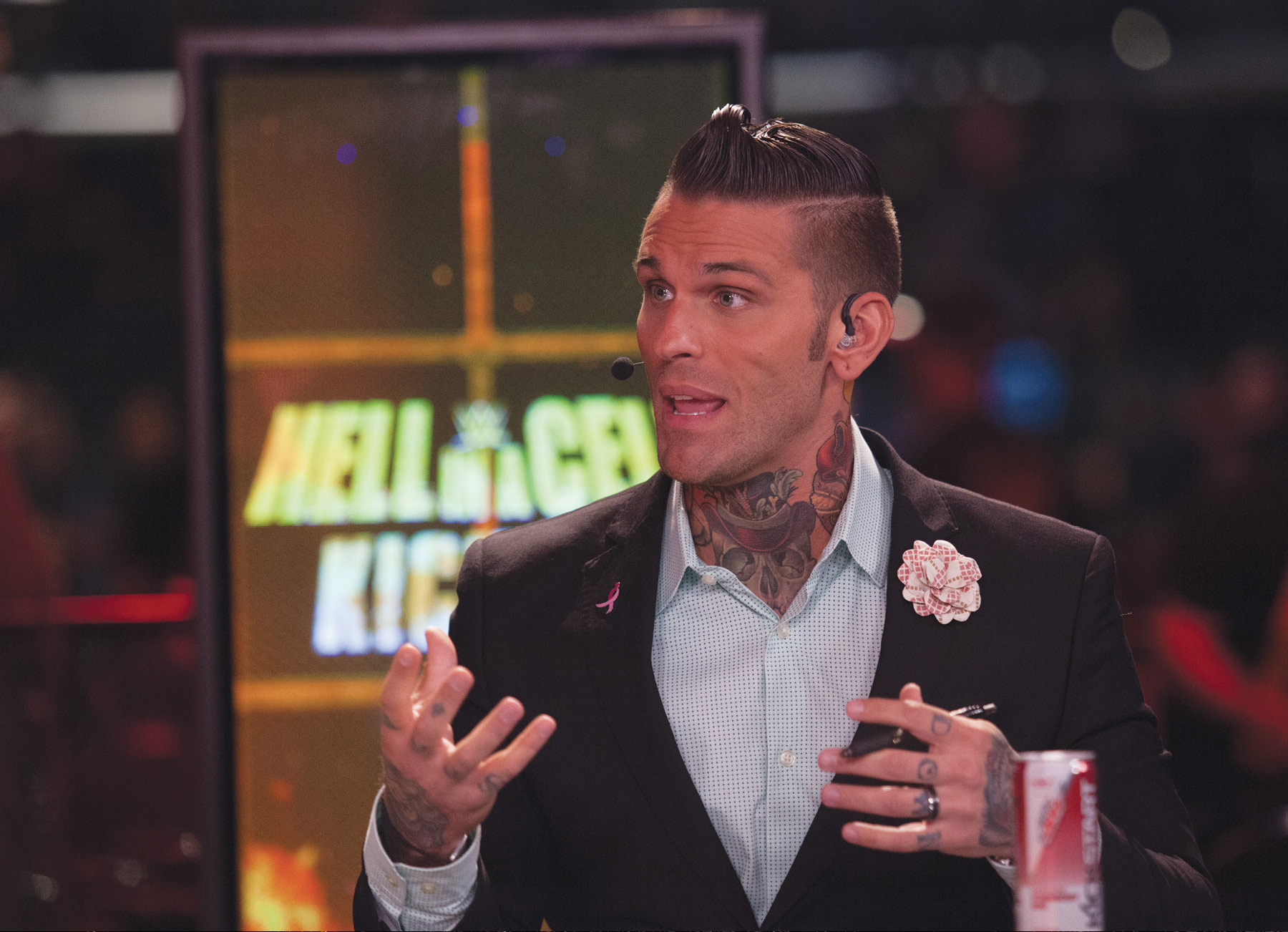CHAPTER 9
Role Reversal
NXT talent receive tutorials on more than slams and submissions. Everyone in the Performance Center building is also given time behind the mic in order to learn how to call matches as an announcer. For up-and-coming talent Corey Graves, it was a lesson that eventually led to a full-time position within WWE after a series of concussions meant his in-ring career was in jeopardy.
“I had absolutely no idea I would become an announcer,” says Graves. “When I got my last concussion, during what would turn out to be my last match ever, it was at Axxess in New Orleans before WrestleMania. I remember after WrestleMania, I couldn’t work for a few months, and one day I was sitting down with Michael Cole, and we were just chatting, and he said, ‘Hey, do me a favor. When you get back to the Performance Center, try jumping into the commentary booth.’ Before then, I hadn’t spent much time in there. I was part of the talent. I wanted to be a Superstar. Little did I know that the time spent in there would end up saving my career at WWE. I didn’t know it at the time, but my in-ring career was over. So while I couldn’t be in the ring, I needed something to do, so I spent hours on end in the commentary booth calling matches with Rich Brennan. Who knew it would pay off big time?
“There was a ton to learn, though. I’ve watched WWE my entire life, and I assumed that being a commentator wasn’t that hard. You just talked about what was going on. But to then learn all of the little nuances—like why you talk about what you do, when to remind the WWE Universe about certain things, how to be subtle and tell stories and not over talk and let certain things breathe—I learned there’s actually way more to doing commentary than I ever realized.”

NXT commentators (left to right): Alex Riley, Rich Brennan, and Corey Graves.
Graves had been working on his commentary skills for a few months when WWE doctors told him that the concussions he’d suffered were severe enough to end his days inside the ring. “I was at a crossroads. I had been working in the booth and doing commentary to keep myself busy; it hadn’t been the career I was pursuing,” remembers Graves. “It was more to keep myself occupied and learn something in case I ever needed something else to fall back on. The whole time I was hurt, I was trying to learn anything and everything about the business that I could. I would sit for hours with Dusty in his office, talking and working on promos. Then eventually, I tried to learn production, and music, and lighting . . . just anything I could, and what is amazing is all of these things can be learned at the Performance Center. There are all of these aspects of the business that I was able to expose myself to. These aren’t things that were forced upon me or offered up on a platter; I had to work and search it out. There are so many different things that are a part of this business that I had no idea about, from commentary to television production, so I set out to learn everything I could. I jumped with both feet into everything. So when I was eventually shut down, Triple H came to me and said, ‘We’re going to give you a chance. It’s not your fault what happened to you. You didn’t screw up, but you don’t have forever to learn something else.’ So I looked at everything, and, eventually, commentary caught on.

Corey Graves reinvents himself as a commentator in NXT.
“When I started to learn commentary, I didn’t put all of my effort and concentration into it because I thought that sooner or later I would be jumping back into the ring. I didn’t really study too much at first, but what amazed me was how much I retained from watching WWE over the years. I was always a huge fan of Jesse Ventura and Bobby Heenan; they’re my all-time favorites. I think that I have a little bit of that flavor, and it’s not intentional, but people will point it out to me, and that makes sense because those guys have been my favorites forever. Now I turn on the WWE Network and put on a pay-per-view from the late ’90s or early ’80s, and I won’t even watch the matches, but I’ll listen to the commentary as I’m doing things around the house. Cole and some of the producers have also been awesome in helping me. They’ll sit there and give me advice, but a lot of my success has really just come from my ability to be myself. When I was Corey Graves the wrestler, I had to be a badass at all times. But now, it’s okay to be a sarcastic goof and make fun of things and entertain myself; luckily, it seems to be translating pretty well.”
Graves’s transition worked so well and so fast in part because of all the tools available inside the Performance Center, including a system called VBrick. It enables Graves, or any wannabe announcer, to request just about any match they can think of, then lend their voice to the action.
“We can make a few phone calls and they can send down pretty much any match in our archives,” says Graves. “We can cue it up and just voice-over all of the commentary. Rich and I would sit in there for hours watching old matches from the main roster and from NXT, and to this day there are some matches I never want to see again because we did commentary on them over and over and over. They were just NXT throwaway TV matches, but it was what we had readily available. So we’d call that same match and we’d try to call it different ways. I’d be pro one guy, then we’d watch it over, and I’d call it a different way the second time. It’s just all about repetition. The VBrick system is pretty awesome, and it gives us access to so many matches. We’d cue up pay-per-view main events days after they happened and put our spin on it, do the commentary our way, and see how it would come out. We would also do all of these Performance Center shows where guys who didn’t work on the live show or guys who were working on something new would come in, and they would do live matches; the audience would be only the boys. We would all sit down and crowd around the ring, and some of us would do commentary during those matches. It’s all about repetition. The more matches you see, the more you practice, the better you get.”
And as Graves improved, he got the call he was hoping for—Levesque offered him a full-time gig to continue his career in NXT as a commentator.
“At first, it was a sigh of relief—I have a family that depends on me. Although I’d worked my whole life to be a WWE Superstar, at least I’m still in the business and with the company I’ve always aspired to work with,” says Graves. “In a weird way, I’ve been offered more opportunities now than when I was a talent. I get to do a lot of really cool things, and the company lets me do a lot of media and appearances—it’s been awesome. I’m having a great time, but I’m not going to lie, I miss being in the ring every day. When we were in Brooklyn—being ringside and hearing how rabid the crowd was—it was bittersweet. But I’ve learned to feed off of the audience’s energy while doing commentary. And to this day, that’s the hardest thing for me. When the crowd is down, doing commentary is tough. But when the crowd is fired up, and in NXT they almost always are, then I’m a fan again.

Corey Graves at the Hell in a Cell kickoff show.
“I get to look at the business in a different way. If I’m saying great things about someone on commentary, it’s because I genuinely enjoy them. I’m very rarely forced to say nice things about someone who I don’t truly believe in. I’m not forced to say things, so I get to act accordingly. It’s real. When someone does something that entertains me as a fan, I can convey that. There’s not this façade that I need to keep up like when I was a talent who was trying to be a tough guy. Corey Graves the Superstar wouldn’t blab about this, but now I get to be myself and I get to talk about the people who truly entertain me.”

